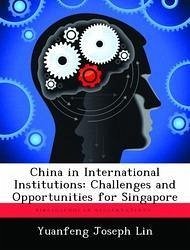Since China first opened its economy in 1978, it has slowly begun playing a larger role in international institutions. As a country that participates actively in multilateral organizations, Singapore is keenly affected by developments in such institutions. International organizations represent an important avenue that small countries like Singapore can use to pursue national objectives and mitigate inherent geopolitical limitations. By comparing China's recent actions at multilateral institutions against Singapore's diplomatic and economic objectives, this thesis finds that China's increased participation and influence in these institutions present near-term opportunities for Singapore. China's willingness to participate in global activities such as peacekeeping and binding treaties are aligned with Singapore's objective of strengthening rules-based institutions among nations to promote stability. Furthermore, China's increased involvement has corresponded with greater trade and investment volumes for Singapore. Nonetheless, there are underlying challenges for Singapore. China's participation in international institutions does not represent a policy that prioritizes institutional solutions when its national interests are challenged. China remains open to flexing its diplomatic and economic muscles to protect its interests. Furthermore, as China's economic prowess increases, its ability to shape international institutions will likely grow. Therefore, Singapore will need to adapt as China plays a larger role in international affairs.
Hinweis: Dieser Artikel kann nur an eine deutsche Lieferadresse ausgeliefert werden.
Hinweis: Dieser Artikel kann nur an eine deutsche Lieferadresse ausgeliefert werden.




![Challenges and Opportunities for the Obama Administration in Central Asia [Enlarged Edition] Challenges and Opportunities for the Obama Administration in Central Asia [Enlarged Edition]](https://bilder.buecher.de/produkte/41/41750/41750623m.jpg)



